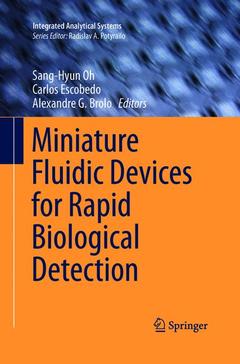Description
Miniature Fluidic Devices for Rapid Biological Detection, 1st ed. 2018
Integrated Analytical Systems Series
Language: English
Subjects for Miniature Fluidic Devices for Rapid Biological Detection:
Publication date: 06-2019
229 p. · 15.5x23.5 cm · Paperback
Publication date: 01-2018
Support: Print on demand
Description
/li>Contents
/li>Biography
/li>Comment
/li>
This book presents an overview of fundamental aspects of surface-based biosensors and techniques for enhancing their detection sensitivity and speed. It focuses on rapid detection using miniaturized sensors and describes the physical principles of nanoscale transducers, surface modifications, microfluidics and reaction engineering, diffusion and kinetics.
A key challenge in the field of bioanalytical sensors is the rapid delivery of target biomolecules to the sensing surface. While various nanostructures have shown great promise in sensitive detection, diffusion-limited binding of analyte molecules remains a fundamental problem. Recently, many researchers have put forward novel schemes to overcome this challenge, such as nanopore channels, electrokinetics, and dielectrophoresis, to name but a few. This book provides the readers an up-to-date account on these technological advances.
Sang-Hyun Oh is a Sanford P. Bordeau Professor in the Department of Electrical and Computer Engineering at the University of Minnesota, Twin Cities. He received his PhD in Applied Physics from Stanford University. His research interests include nanotechnology, biosensors, nano-optics, and nanofabrication.
Carlos Escobedo is an Assistant Professor in the Department of Chemical Engineering at Queen's University. He received his PhD in Mechanical Engineering from the University of Victoria. His research interests include the development of (bio)sensing technology, and microfluidic platforms to advance knowledge in medicine and biology.
Alexandre G. Brolo is a Professor of Chemistry at the University of Victoria, Canada. He received his PhD in Physical Chemistry from the University of Waterloo, Canada. His current research interest includes surface spectroscopy, biosensors and metallic nanostructures.Focuses on rapid detection using miniaturized sensors
Describes the physical principles of nanoscale sensors, surface modifications, microfluids and reaction engineering, diffusion and kinetics
Covers fundamental aspects of surface-based biosensors and techniques for enhancing their detection sensitivity and speed




